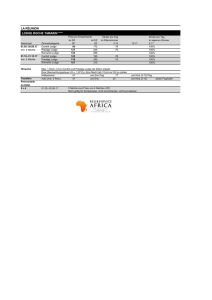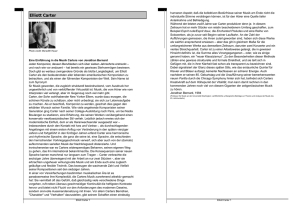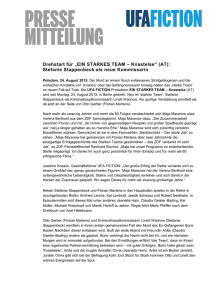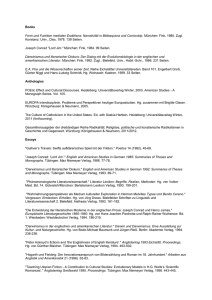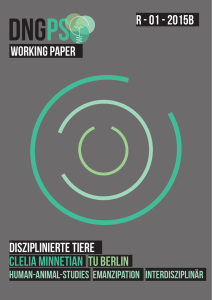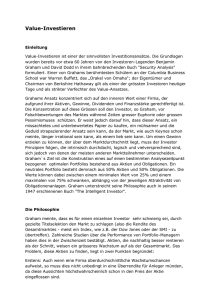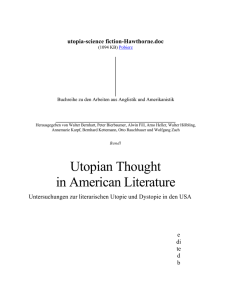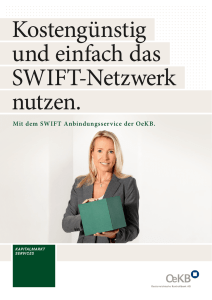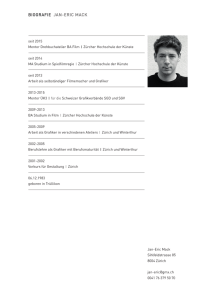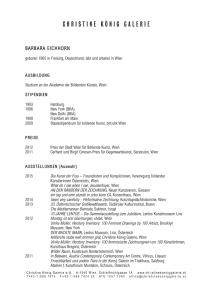Bibliographie Postmodernism Anthologies and introductions
Werbung
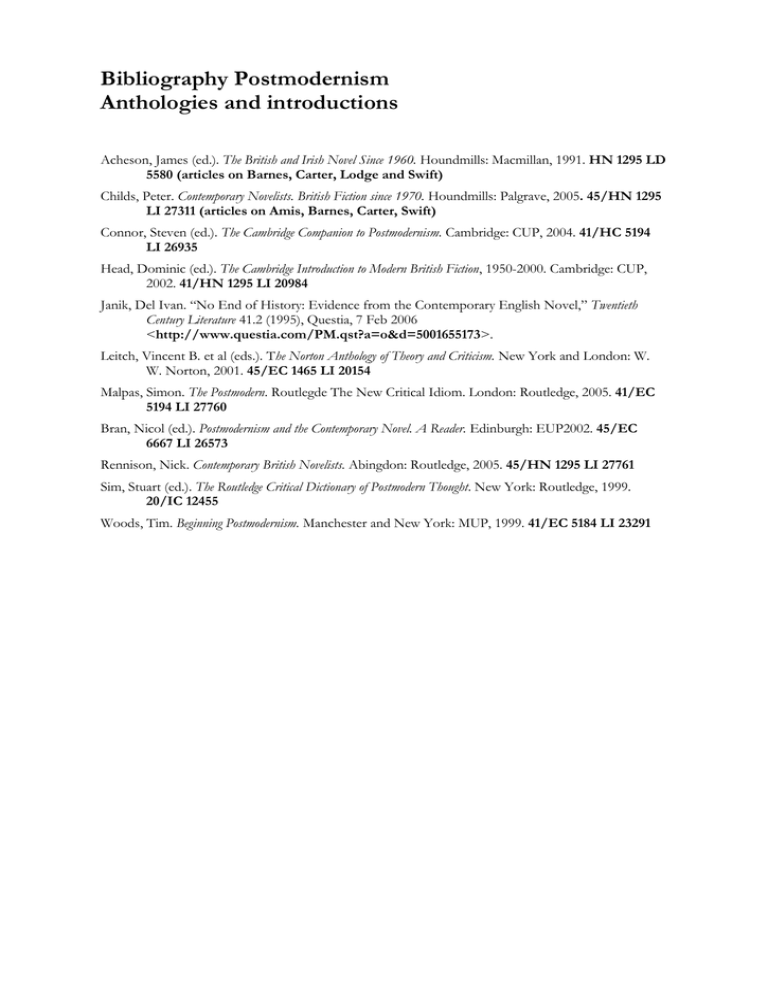
Bibliography Postmodernism Anthologies and introductions Acheson, James (ed.). The British and Irish Novel Since 1960. Houndmills: Macmillan, 1991. HN 1295 LD 5580 (articles on Barnes, Carter, Lodge and Swift) Childs, Peter. Contemporary Novelists. British Fiction since 1970. Houndmills: Palgrave, 2005. 45/HN 1295 LI 27311 (articles on Amis, Barnes, Carter, Swift) Connor, Steven (ed.). The Cambridge Companion to Postmodernism. Cambridge: CUP, 2004. 41/HC 5194 LI 26935 Head, Dominic (ed.). The Cambridge Introduction to Modern British Fiction, 1950-2000. Cambridge: CUP, 2002. 41/HN 1295 LI 20984 Janik, Del Ivan. “No End of History: Evidence from the Contemporary English Novel,” Twentieth Century Literature 41.2 (1995), Questia, 7 Feb 2006 <http://www.questia.com/PM.qst?a=o&d=5001655173>. Leitch, Vincent B. et al (eds.). The Norton Anthology of Theory and Criticism. New York and London: W. W. Norton, 2001. 45/EC 1465 LI 20154 Malpas, Simon. The Postmodern. Routlegde The New Critical Idiom. London: Routledge, 2005. 41/EC 5194 LI 27760 Bran, Nicol (ed.). Postmodernism and the Contemporary Novel. A Reader. Edinburgh: EUP2002. 45/EC 6667 LI 26573 Rennison, Nick. Contemporary British Novelists. Abingdon: Routledge, 2005. 45/HN 1295 LI 27761 Sim, Stuart (ed.). The Routledge Critical Dictionary of Postmodern Thought. New York: Routledge, 1999. 20/IC 12455 Woods, Tim. Beginning Postmodernism. Manchester and New York: MUP, 1999. 41/EC 5184 LI 23291 Key texts Assman, Jan. Das kulturelle Gedächtnis. Schrift, Erinnerung und politische Identität in frühen Hochkulturen. München: Beck, 1992. 40/ER 751 LD 9671(99) Baudrillard, Jean. 1981. “The Precession of Simulacra.” In: Baudrillard, Jean. Simulacra and Simulation. Trans. Sheila Faria Glaser. Ann Arbor: University of Michigan Press, 1994. 40/IH 14900 LF 9264 Butler, Judith. Gender Trouble.Feminism and the Subversion of Identity. London: Routledge, 1990. 40/IH 54211 LF 5603 (dt.) Derrida, Jacques. 1976. Of Grammatology. Trans. Gayatri Spivak. Baltimore: Johns Hopkins UP, 1998. Eagleton, Terry. The Illusions of Postmodernism. Oxford: Blackwell, 1996. 40/EC 1740 LG 3374 Eco, U., Postscript to The Name of the Rose, New York: Harcourt, 1984. Foucault, Michel. 1978. “The Repressive Hypothesis.” In: The History of Sexuality: An Introduction. Vol. 1. London: Penguin, 1984, 1-49. Foucault, Michel. 1969. “What is an Author?” In: Davis, Robert Con and Schleifer, Ronald (eds.). Contemporary Literary Criticism. Literary and Cultural Studies. 4th ed. New York: Longman, 1998. 342-353. 41/EC 1720 FP 8735(4) Harvey, David. The Condition of Postmodernity: An Enquiry into the Origins of Cultural Change. Oxford: Blackwell, 1989. 50/NW 1950 DY 1339 Hutcheon, Linda. A Poetics of Postmodernism. New York: Routledge, 1988. Hutcheon, Linda. The Politics of Postmodernism. New York: Routledge, 1989. Jameson, Fredric. Postmodernism, or, the Cultural Logic of Late Capitalism. Durham: Duke University Press, 1991. 45/EC 2400 LD 7031 Jencks, Charles. “Postmodernism Defined” (1986). In: Nicol, 113-120. 45/EC 6667 LI 26573 Kristeva, Julia. 1968. “Semiotics: A Critical Science and/or a Critique of Science.” In: Davis, Robert Con and Schleifer, Ronald (eds.). Contemporary Literary Criticism. Literary and Cultural Studies. 4th ed. New York: Longman, 1998. 273-282. 41/EC 1720 FP 8735(4) Lyotard, Jean-Francois. 1979. The Postmodern Condition: A Report on Knowledge. Minnealpolis: University of Minneapolis Press, 1993. 31/MS 6950 WU 8346 Said, Edward. Orientalism, New York: Vintage, 1979. 41/EC 5910 FA 8012 Sontag, Susan. “Against Interpretation.” In: Against Interpretation and Other Essays. New York: Farrar, Strauss & Giroux, 1966, 4-14. 40/HU 8501 FB 3068 oder http://www.coldbacon.com/writing/sontag-againstinterpretation.html White, Hayden. 1974. “The Historical Text as Literary Artefact.” In: NATC, 1709-1729. David Lodge, Small World Lodge, David. 1977. “Postmodernist Fiction.” In: Nicol, 250-277. 45/EC 6667 LI 26573 Ahrens, Rüdiger. “Satirical Norm and Narrative Technique in the Modern University Novel: David Lodge’s Changing Places and Small World.” In: Schwend, Joachim et al (eds.). Literatur im Kontext/Literature in Context. Scottish Studies 14. Frankfurt: Peter Lang, 1992, 277-95. 40/HD 140 LD 9001 Ammann, Daniel. David Lodge and the Art-and-reality Novel. Heidelberg: Winter, 1991. 40/HN 5646 LD 4844 Coelsch-Foisner, Sabine. “Sex-Maniacs, Errant Knights and Lady Professors: Romance and Satire in Lodge’s University Novels.” In: Coelsch-Foisner, Sabine et al (eds.). Trends in English and American Studies: Literature and the Imagination. Lewiston, NY: Mellen, 1996, 333-49. 40/HD 140 LH 1093 Galster, Christin. Literaturtheorie und Wissenschaftsbetrieb im britischen Universitätsroman. Campus Novels von David Lodge, Malcolm Bradbury und A. S. Byatt. Regensburg: Pustet. 1997. http://www.bibliothek.uni-regensburg.de/opus/volltexte/2001/19/pdf/RSL6.pdf Holmes, Frederick M. “The Reader as Discoverer in David Lodge’s Small World.” Critique: Studies in Contemporary Fiction 32:1 (1990), 47-57. Kühn, Thomas. Two Cultures, Universities, and Intellectuals. Der Englische Universitätsroman der 70er und 80er Jahre im Kontext des Hochschuldiskurses. Tübingen: Narr, 2002. Laing, Stuart. “The Three Small Worlds of David Lodge.” Critical Survey 3:3 (1991), 324-30. Lambertsson Björk, Eva. Campus Clowns and the Canon. David Lodge’s Campus Fiction. Stockholm: Almqvist & Wiksell, 1993. 40/HN 5646 LF 5591 Louw, William. “Irony in the Text or Insincerity in the Writer? The Diagnostic Potential of Semantic Prosodies.” In: Sampson, Geoffrey and McCarthy, Diana (eds.). Corpus Linguistics: Readings in a Widening Discipline. London: Continuum, 2004, 229-41. 40/ES 965 LI 30009 Mews, Siegfried. “The Professor’s Novel: David Lodge’s Small World.” MLN 104:3 (1989), 713-26. 45/.ZP 6120-104,2 Morace, Robert A. The Dialogic Novels of Malcolm Bradbury and David Lodge. Carbondale: Southern Illinois UP, 1989. 40/HN 2295 LB 8920 Pfandl-Buchegger, Ingrid. David Lodge als Literaturkritiker, Theoretiker und Romanautor Heidelberg: Winter, 1993. 40/HN 9990 LF 4323 Showalter, Elaine. Faculty Towers. The Academic Bovel and its Discontents. Oxford: OUP, 2005. Soler, Pascual and Nieves, Ma. “The Anxiety of Influence in the Academic Novel: A Trap for Fools and Small World.” Grove: Working Papers on English Studies 1 (1996), 131-46. Wolf, Werner. „Literaturtheorie in der Literatur: David Lodges Small World als kritische Auseinandersetzung mit dem Dekonstruktivismus.” Arbeiten aus Anglistik und Amerikanistik 14:1 (1989), 19-37. 45/.ZP 0657-12/14 Womack, Kenneth. “The Professoriate of Love: David Lodge’s Academic Trilogy and the Ethics of Romance.” In: Womack, Kenneth. Postwar Academic Fiction. Satire, Ethics, Community. Houndmills: Peter Ackroyd, The Last Testament Palgrave, 2002. 41/HN 1301 LI 26231 of Oscar Wilde Fokkema, Aleid. “The Author: Postmodernism’s Stock Character. In: Franssen, Paul and Hoenselaars, Ton (eds.). The Author as Character: Representing Historical Writers in Western Literature. Madison, NJ: Fairleigh Dickinson UP, 1999, 39-51. 40/EC 2200 LI 21950 Fokkema, Aleid. “Abandoning the Postmodern? The Case of Peter Ackroyd.” In: D’haen, Theo and Bertens, Hans (eds.). British Postmodern Fiction. Amsterdam: Rodopi, 1993, XX. 40/HN 1331 LE 9210 Höfele, Andreas. “The Writer on Stage: Some Contemporary British Plays about Authors.” In: Reitz, Bernhard and Zapf, Hubert (eds.). British Drama in the 1908s. New Perspectives. anglistik und englischunterricht 41 (1990), 79-91. 45/HN 1600 LD 2197 Maack, Annegret. „Der Roman als ‘Echokammer’: Peter Ackroyds Erzählstrategien” In: Foltinek, Herbert et al (eds.) Tales and „their telling difference”: Zur Theorie und Geschichte der Narrativik. Festschrift zum 70. Geburtstag von Franz K. Stanzel. Heidelberg: Carl Winter Universitätsverlag, 1999, 319-35. 40/HD 140 LE 6035 Maack, Annegret. „Das Leben der toten Dichter. Fiktive Biographien.” In: Maack, Annegret (ed.). Radikalität und Mäßigung. Der englische Roman seit 1960. Darmstadt: Wissenschaftliche Buchgesellschaft 1993, XX. 41/HN 1295 LE 4818 (verstellt) Middeke, Martin. “Oscar, the Proto-Postmodern? Peter Ackroyd’s The Last Testament of Oscar Wilde.” In: Böker, Uwe et al (eds.). The Importance of Reinventing Oscar: Versions of Wilde during the Last 100 Years. Amsterdam: Rodopi, 2002, 207-17. 45/HL 4865 LI 21840 Middeke, Martin and Huber, Werner (eds.). Biofictions: The Rewriting of Romantic Lives in Contemporary Fiction and Drama. Rockester, NY: Camden House, 1999. 40/HN 1301 LH 7488 Schabert, Ina. In Quest of the Other Person: Fiction as Biography. Tübingen: Francke, 1990. 40/HG 725 LC 8236 Moran, Joe. “’Simple Words’: Peter Ackroyd’s Autobiography of Oscar Wilde.” Biography: An Interdisciplinary Quarterly 22:3 (1999), 356-69. Nünning, Ansgar. Von historischer Fiktion zu historiographischer Metafiktion. Vol. 1: Theorie, Typologie und Poetik des historischen Romans. Trier: WVT, 1995. 45/HN 1301 LF 6764-1 Onega, Susana. Peter Ackroyd. Plymoth: Northcote House, 1998. Onega, Susana. Metafiction and Myth in the Novels of Peter Ackroyd. Rockester, NY: Camden House, 1999. Schabert, Ina. “Fictional Biography, Factual Biography, and Their Contaminations.” biography 5:1. 1992, 1-16. Martin Amis, Time’s Arrow Diedrick, James. Understanding Martin Amis. Columbia: U of South Carolina Press, 1995. 41/HN 1761 LG 1914 Harris, Greg. “Men Giving Birth to New World Orders: Martin Amis’s Time’s Arrow.” Studies in the Novel 31:4 (1999), 489-505. 45/.ZP 9100-31 Henke, Christoph.”Remembering Selves, Constructing Selves: Memory and Identity in Contemporary British Fiction.” Journal for the Study of British Cultures 10:1 (2003), 77100. 45/.ZP 4284-7/10 Menke, Richard. “Narrative Reversals and the Thermodynamics of History in Martin Amis’s Time’s Arrow.” Modern Fiction Studies 44 (1998). pp. 959-980. 45/.ZP 5960-44 Mecklenburg, Susanne. Martin Amis und Graham Swift. Erfolg Durch Bodenlosen Moralismus im Zeitgenössischen Britischen Roman. Heidelberg: Winter, 2000. 40/HN 1761 LI 26386 Ryan, Kiernan. “Sex, Violence and Complicity: Martin Amis and Ian McEwan.” In: Mengham, Rod (ed.). An Introduction to Contemporary Fiction. Cambridge: Polity Press, 1999, 203218. Sauerberg, Lars Ole. Fact into Fiction. Documentary Realism in the Contemporary Novel. Basingstok: Macmillan, 1991. 40/HU 1819 LD 4290 Schoenbeck, Oliver. Their Versions of the Facts. Text und Fiktion in den Romanen von Iain Banks, Kazuo Ishiguro, Martin Amis und Jeanette Winterson. Trier: WVT, 2000. 40/HN 1331 LI 12156 (derzeit SA Dommer) Stokes, Peter. “Martin Amis and the Postmodern Suicide: Tracing the Postnuclear Narrative at the Fin de Millenium.” Critique. Studies in Contemporary Fiction 38:4 (1997), 300-311. 45/.ZP 1760-37/38 Tredell, Nicolas (ed.). The Fiction of Martin Amis. Cambridge: Icon Books, 2000. Angela Carter, Nights at the Circus Armitt, Lucy. Contemporary Women’s Fiction and the Fantastic. Houndmills: Macmillan, 2000. 41/HN 1312 LH 9979 Benedikz, Margret. Storming the Sadeian Citadel. Disturbing Gender in Angela Carter’s Fiction of Transition. Diss. Stockholm: Dept. of English, Univ., 2002. 40/.XE 4151 Boehm, Berth A. “Feminist Metafiction and Androcentric Reading Strategies: Angela Carter’s Reconstructed Reader in Nights at the Circus.” Critique. Studies in Contemporary Fiction 37:1 (1995), 35-49. 45/.ZP 1760-37/38 Carroll, Rachel. “Return of the Century: Time, Modernity, and the End of History in Angela Carter’s Nights at the Circus.” Yearbook of English Studies, 30. Time and Narrative (2000), 187-201. 45/.ZP 9730-30 Day, Aidan. Angela Carter. The Rational Glass. Manchester: MUP, 1998. 41/HN 2593 LI 11580 Easton, Alison. Angela Carter. Contemporary Critical Essays. Basingstoke: Macmillan, 2000. 40/HN 2593 LI 10376 Kendrick, Walter. “The Real Magic of Angela Carter.” In: Hosmer, Robert E. Jr. (ed.). Contemporary British Women Writers. Houndmills: Macmillan, 1993, 66-84. 45/HN 1301 LF 9514 Lee, Alison. Angela Carter. New York: Twayne, 1997. 41/HN 2593 LG 8076 Macperhson, Heidi Slettedahl. “Prison, Passion, and the Female Gaze: Twentieth-Century Representations of Nineteenth-Century Panopticons.” In: Fludernik, Monika (ed.). In the Grip of the Law. Trials, Prisons and the Space Between. Frankfurt a. M.: Lang, 2004, 20521. 41/HG 435 LI 26621 Martinsson, Yvonne. Eroticism, Ethics and Reading. Angela Carter in Dialogue with Roland Barthes. Diss. Stockholm: Almqvist & Wiksell, 1996. 40/HN 2593 LG 6148 Morrison, Jago. Contemporary Fiction. London: Routledge, 2003. Müller, Anja. Angela Carter. Identity Constructed, Deconstructed. Heidelberg: Winter, 1997. 40/HN 2593 LI 29467 Peach, Linden. Angela Carter. Macmillan Modern Novelists. Basingstoke: Macmillan, 1998. 40/HN 2593 LH 4398 Sage, Lorna. Flesh and the Mirror. Essays on the Art of Angela Carter. London:Virago Press, 1994. 40/HN 2593 LF 2554 Sage, Lorna. Angela Carter. Plymouth: Northcote House, 1994. 45/HN 9990 LF 1704 Julian Barnes, Flaubert’s Parrot Antor, Heinz. „(Post-)Moderne Historiographie und Biographie im englischen Roman des 20. Jahrhunderts: Virginia Woolf und Julian Barnes.” In: Ahrens, Rüdiger and Neumann, Fritz-Wilhelm (eds.). Fiktion und Geschichte in der anglo-amerikanischen Literatur. Anglistische Forschungen. 256. Heidelberg: Carl Winter, 1998, 415-30. 40/HD 140 LH 1639 Brooks, Neil. “Interred Textuality: The Good Soldier and Flaubert’s Parrot.” Critique: Studies in Contemporary Fiction 41:1 (1999), 45-51. Cox, Emma. “‘Abstain, and Hide Your Life’: The Hidden Narrator of Flaubert’s Parrot.” Critique: Studies in Contemporary Fiction 46:1 (2004), 53-62. 45/ZP 1760 Higdon, David Leon. “‘Unconfessed Confessions:’ The Narrators of Graham Swift and Julian Barnes.” In: Acheson, James (ed.). The British and Irish Novel since 1960. Basingstoke and London: Macmillan, 1991, 174-191. 45/HN 1295 LD 5580 Kotte, Christina. Ethical Dimensions in British Historiographic Metafiction. Julian Barnes, Graham Swift, Penelope Lively. Trier: WVT, 2001. 40/HN 1295 LI 16687 Moseley, Merritt. “Julian Barnes’s Flaubert’s Parrott.” In: Shaffer, Brian W. (ed.). A Companion to the British and Irish Novel, 1945-2000. Blackwell Companions to Literature and Culture 28. Malden, MA: Blackwell, 2005, 481-92. 45/HN 1295 LI 28409 Moseley, Merritt. Understanding Julian Barnes. Columbia: Univ. of South Carolina Press, 1997. 41/HN 1887 LG 8173 Reckwitz, Erhard. “Intertextualität postmodern: J.M. Coetzee, Foe; John Fowles, A Maggot; Julian Barnes, Flaubert’s Parrot.” In: Bering, Kinibert und Hohmann, W. L. (eds.). Wie postmodern ist die Postmoderne? Essen: Die Blaue Eule, 1990, 121-156. 20/CI 1100 IA 3090 Scott, James B. “Parrot as Paradigms: Infinite Deferral of Meaning in Flaubert’s Parrot.” Ariel 21 (1990), 57-68. 45/.ZP 0800-21 Sesto, Bruce. Language, History and Metanarrative in the Fiction of Julian Barnes. New York: Lang, 2001. 40/HN 1887 LI 19260 A. S. Byatt, The Biographer’s Tale Kelly, Kathleen Coyne. A. S. Byatt. New York: Twayne, 1996. 41/HN 2571 LG 5100 Todd, Richard. A. S. Byatt. Plymouth: Northcote, 1997. 41/HN 2571 LH 5500 Tönnies, Merle. “A New Self-Conscious Turn at the Turn of the Century? Postmodernist Metafiction in Recent Works by’Established’ British Writers.” Anglistik und Englischunterricht 66 (2005), 5782. (Reihe nur bis 2003 vorhanden) Nünning, Ansgar. “Fictional Metabiographies and Metaautobiographies: Towards a Definition, Typology and Analysis of Self-Reflexive Hybrid Metagenres.” In: Huber, Werner et al (eds.). Self-Reflexivity in Literature. Text & Theorie 6. Würzburg: Königshausen & Neumann, 2005, 195-209. (noch nicht vorhanden) O’Connor, Erin. “Reading The Biographer’s Tale” Victorian Studies 44:3 (2002), 379-87. 45/.ZP 9420-44 oder http://emedia.unibamberg.de/han/7346/www.ingentaconnect.com/content/iup/vs/2002/00000044/00 000003/art00001 Sorensen, Sue. “Something of the Eternal: A.S. Byatt and Vincent Van Gogh.” Mosaic. 37:1 (2004), Questia, 7 Feb 2006 <http://www.questia.com/PM.qst?a=o&d=5002649583>. Christine Brooke-Rose, Textermination Birch, Sarah. Christine Brooke-Rose and Contemporary Fiction. Oxford: Clarendon, 1994. 40/HN 2455 LE 8872 Friedman, Ellen J. (ed.). Utterly Other Discourse. The Texts of Christine Brooke-Rose. Normal, Ill.: Dalkey Archive Press, 1995. 40/HN 2455 LG 1235 Lawrence, Karen R. “Saving the Text: Cultural Crisis in Textermination and Masterpiece Theatre.” Narrative 5:1 (1997), 108-16. Graham Swift, Waterland Acheson, James. “Historia and Guilt: Graham Swift’s Waterland.” Critique: Studies in Contemporary Fiction 47:1 (2005), 90-100. 45/ZP 1760 Alphen, Ernst van. “The Performativity of Histories: Graham Swift’s Waterland as a Theory of History.” In: Bal, Mieke et al (eds.). The Point of Theory: Practices of Culture Analysis. New York: Continuum, 1994, 202-210. 40/LB 19015 LF 1380 Bormann, Daniel Candel. “Transgression and Stability in Graham Swift’s Waterland.” Zeitschrift für Anglistik und Amerikanistik 48:4 (2000), 354-63. 45/.ZP 9800-48 Champion, Margrét Gunnarsdóttir. “Cracked Voices: Identification and Ideology in Graham Swift’s Waterland.” Critique: Studies in Contemporary Fiction 45:1 (2003), 34-42. 45/ZP 1760 Cooper, Pamela. “Imperial Topographies: The Spaces of History in Waterland.” Modern Fiction Studies 42 (1996), 371-396. 45/.ZP 5960-42 Decoste, Damon Marcel. “Question and Apocalypse: The Endlessness of Historia in Graham Swift’s Waterland.” Contemporary Literature 43:2 (2002), 377-99. 45/.ZP 1640-43 Haefner, Gerhard. „Geschichte und Natur in Graham Swifts Waterland.” In: Groß, Konrad (eds.). Das Natur/Kultur-Paradigma in der englischsprachigen Erzählliteratur des 19. und 20. Jahrhunderts: Festschrift zum 60. Geburtstag von Paul Goetsch. Tübingen: Narr, 1994, 208-221. 40/HD 140 LE 7235 Irish, Robert K. “’Let me tell you’: About Desire and Narrativity in Graham Swift’s Waterland.” Modern Fiction Studie, 44 (1998), 917-934. 45/.ZP 5960-44 Janik, Del Ivan. “History and the ‘Here and Now’: The Novels of Graham Swift.” Twentieth Century Literature: A Scholarly and Critical Journal 35:1 (1989), 74-88. 45/.ZP 9360-35 Kotte, Christina. Ethical Dimensions in British Historiographic Metafiction. Julian Barnes, Graham Swift, Penelope Lively. Trier: WVT, 2001. 40/HN 1295 LI 16687 Landow, George P. “History, His Story, and Stories in Graham Swift’s Waterland.” Studies in the Literary Imagination 23:2 (1990), 197-211. 40/.ZP 9090-22/23 McKinney, Ronald H. “The Greening of Postmodernism: Graham Swift’s Waterland.” New Literary History 28:4 (1997), 821-832. 45/.ZP 6640-28 Mecklenburg, Susanne. Martin Amis und Graham Swift. Erfolg Durch Bodenlosen Moralismus im Zeitgenössischen Britischen Roman. Heidelberg: Winter, 2000. 40/HN 1761 LI 26386 Sandbach-Dahlström, Catherine. “Waterland: History upon History.” In: Robertson, David (ed.). English Studies and History. Tampere English Studies 4. Tampere: Univ. of Tampere, 1994, 165-175. 40/HG 260 LG 9256 Schad, John. “The End and the End of History: Graham Swift’s Waterland.” Modern Fiction Studies 38 (1992), 911-925. 45/.ZP 5960-38 Stierstorfer, Klaus. “Wobbly Grounds: Postmodernism’s Precarious Footholds in Novels by Malcolm Bradbury, David Parker, Salman Rushdie, Graham Swift.” In: Stierstorfer, Klaus (ed.). Beyond Postmodernism: Reassessments in Literature, Theory, and Culture. Berlin: de Gruyter, 2003, 213-234. 40/EC 5149 LI 24984a Todd, Richard. “Narrative Trickery and Performative Historiography: Fictional Representation of National Identity in Graham Swift, Peter Carey, and Mordecai Richler.” In: Zamora, Lois Parkinson and Faris, Wendy B. (eds.). Magical Realism: Theory, History, Community. Durham: Duke UP, 1995, 307-328. 40/EC 5194 LF 7978 Widdowson, Peter. Graham Swift. Tavistock: Northcote House, 2004. bestellt Winnberg, Jakob. An Aesthetics of Vulnerability. The Sentimentum and the Novels of Graham Swift. Göteborg: Göteborg Univ., Dep. of Engl., 2003. 40/HN 8235 LI 25626

